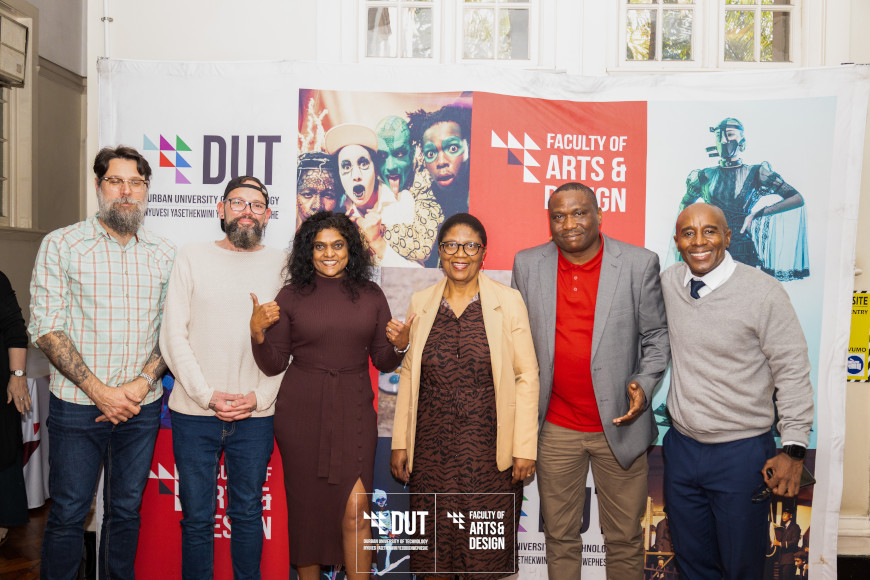The Faculty of Arts and Design (FoAD) at Durban University of Technology (DUT) has launched its inaugural Doctoral Academy, aiming to provide vital support to PhD students. The academy was respectively inaugurated at the Durban and Midlands campuses on 8 August and 15 August 2025. It was conceptualised by Professor Pholoho Morojele, the experienced researcher and FAD Executive Dean, and will be overseen by Dr Nathan Slabbert-Gorringe.
The Faculty of Arts and Design Doctoral Academy aims to facilitate PhD completion and support career growth. During the event, Professor Morojele stated that the project is founded on the belief that doctoral education should be transformative, dialogue-driven, and responsive to the unique rhythms of creative and performative scholarship.
“At the heart of the FoAD Doctoral Academy lies a commitment to cultivating interactive and dialogical learning spaces, environments where knowledge is not simply transferred, but co-constructed. These spaces are inspired by the works of Paulo Freire (1970) and Bell Hooks (1994), who reject the traditional banking model of education. Instead, they invite both supervisors and students into a dynamic exchange, a dialogical praxis, where reflection, creativity, and critical engagement fuel not only knowledge production but self-formation,” he said.
Professor Morojele said the project is not accidental but is strategically crafted to speak directly to the FoAD’s DNA- a faculty that is performative, practice-led, materially engaged, and conceptually bold.
“In the visual and performing arts, knowledge is often embodied, iterative, and emergent. Our research journeys are not linear; they dance, pause, improvise, and provoke. The academy, therefore, seeks to create capacitating ecosystems that respect and extend these models of knowing,” said a jubilant Morojele.
The Academy is a response to the need for more inclusive and context-sensitive doctoral training, specificities of the arts and design disciplines and the urgent imperative to graduate students who are not only researchers but are changemakers, equipped to disrupt, inspire and reimage futures.
Doctoral students will not be the sole focus of the Academy. Supervisors and Postdoctoral Fellows will also be capacitated through a series of workshops and practical support.
“When we cultivate capacitated supervision and research spaces, we accelerate student progression without compromising quality, strengthen the research cultures of departments, empower emerging scholars to see themselves as leaders, and build a faculty that is globally relevant while locally rooted,” Professor Morojele noted.
Dr Slabbert-Gorringe, also emphasised that the purpose of the Academy is to offer rigorous proposal development, structured supervision, ongoing mentorship, and support for research enhancement.
Explaining how the Academy will operate, Dr Slabbert-Gorringe says the Doctoral Academy is not intended to replace any existing structures, but to further support and enhance them. This will be achieved through:
- Rigorous Proposal Development and Ethical Clearance
- Monitoring, Mentoring and Thesis Completion Support
- Supervision and Research Enhancement for Staff and Postdoctoral Fellows
Another key segment in the event included a reflection by Visual Communication Design lecturer and PhD candidate, Mr Rory van As, who spoke about the difficulties of the PhD journey, saying that it can be isolating, particularly for creatives. Van As, who will be graduating with his PhD soon, also thanked Dr Slabbert-Gorringe for encouraging him to pursue his own research journey, noting his support as both a colleague and mentor.
Postdoctoral Fellow in the Media, Language and Communication Department, Dr James Akpan, highlighted the importance of fellowship and mentorship in alleviating the pressure often placed on scholars. His sentiments echoed those of van As, highlighting the value of initiatives like the Doctoral Academy in creating spaces not only for academic growth but also for social interaction and emotional well-being. He urged scholars to celebrate their milestones, no matter how small, to remain ethically grounded and to remain flexible in their methodologies, stressing that research itself is a methodological journey.
FoAD’s Research Coordinator, Dr Dianna Moodley, addressed the importance of strengthening supervision and research support, warmly welcoming the Doctoral Academy into the faculty.
Media, Language and Communication’s Acting Head of Department, Professor Maleshoane Rapeane-Mathonsi, applauded Professor Morojele for initiating the Academy, saying it will redeem the Faculty of Arts and Design and DUT. Professor Rapeane-Mathonsi, who also is a former Research Coordinator for the Faculty of Arts and Design, spoke about the challenges facing postgraduate students, lecturers and supervisors, citing the pivotal role the Academy will play in providing holistic support to researchers.
In closing, Professor Morojele extended an invitation to all stakeholders to embrace the Academy as a shared space: “Let me end by inviting each of you, students, supervisors and collaborators to take full ownership of this space. Let it not be a program that is done to you, but a community you shape and grow. For it is in such shared, embodied and imaginative spaces that true transformation begins.”
The Faculty of Arts and Design offers three doctoral qualifications: Doctorate in Education [DEd], Doctor of Technology Language Practice, Doctor of Philosophy in Visual and Performing Arts and will soon offer a PhD in Adult and Community Education.
Enquiries about joining the Faculty of Arts and Design Doctoral Academy can be directed to Dr Slabbert-Gorringe at nathant@dut.ac.za
Pictured: Left to right: Mr Rory van As, Dr Nathan Slabbert-Gorringe, Dr Dianna Moodley, Professor Maleshoane Rapeane-Mathonsi, Dr James Akpan and Professor Pholoho Morojele. Image by Mphiliseni Manqele.
Andile Dube/Nkosingiphile Dladla

